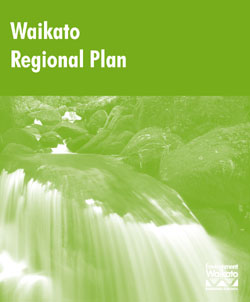Waikato Regional Plan
 The Waikato Regional Plan implements the Regional Policy Statement. The plan contains policy and methods to manage the natural and physical resources of the Waikato region.
The Waikato Regional Plan implements the Regional Policy Statement. The plan contains policy and methods to manage the natural and physical resources of the Waikato region.
Plan status
The Waikato Regional Plan is operative.
Note: There is currently one Proposed plan change to the Regional Plan - Proposed Waikato Regional Plan Change 1- Waikato and Waipa River Catchment. The plan change introduces new rules to manage farming activities that may adversely affect freshwater quality in the Waikato and Waipa river catchment. It also contains objectives and policies which generally apply to all activities that affect water quality in these catchments.
What area does the plan cover?
The plan applies across the whole of the Waikato region, although some objectives, policies and rules apply only in specific parts of the region.
The plan does not apply to the coastal marine area (CMA) below mean high water springs. For objectives, policies and rules in this area refer to the Regional Coastal Plan.
Freshwater Policy Review
We have commenced a review of the Waikato Regional Plan and the Waikato Regional Policy Statement to give effect to the National Policy Statement for Freshwater Management (NPS-FM) 2020.
Freshwater Management Amendments to the Waikato Regional Plan
Clause 3.22 of the National Policy Statement for Freshwater Management 2020 requires regional councils to include a specific policy regarding natural inland wetlands in regional plans. This policy was inserted into the Waikato Regional Plan in 2021 as Policy 3.A.2. The Minister for the Environment subsequently made changes to this clause and further changes were made in the Resource Management (Freshwater and Other Matters) Amendment Act 2024. Waikato Regional Council is therefore required to amend the Waikato Regional Plan to include the updated policy wording.
On 5 December 2024, in accordance with s55(2A) of the Resource Management Act 1991, Policy 3.A.2 in Section 3A of the Waikato Regional Plan was amended to incorporate the changes made to clause 3.22 of the National Policy Statement for Freshwater Management 2020.
The required amendments to Policy 3.A.2 in Section 3A of the Waikato Regional Plan are set out here. The amended plan can be read below.
Read the plan
-
Expand below to view the full table of contents. To find out about rules that apply to particular activities, please refer to the activity guide within the plan itself.
The plan contains objectives, policies and implementation methods for:
- matters of significance to Māori
- water quality, flows and levels
- water takes
- efficient use of water
- discharges
- damming and diverting
- wetlands
- drilling
- non-point source discharges
- structures on the beds of rivers and lakes
- river and lake bed disturbance
- accelerated erosion
- discharges onto or into land
- contaminated sites
- air quality
- spray drift
- cross boundary processes
- monitoring and review
- information requirements for resource consents.
Some of the sections in the plan refer to Waikato Regional Plan maps. These maps show where waterbodies and geothermal systems in the region are classified for specific management purposes.
- Geothermal maps
- Water allocation maps
- Waterbody classification maps
To view all the maps, please refer to the plan in E-plan.
If you need more help or information with any of the plan maps, please contact us.
What's in the plan?
Read the plan online (e-plan)
Download the plan (PDF format)
Proposed changes
Changes to the plan
-
Changes to the regional plan required by National Policy Statement for Greenhouse Gas Emissions from Industrial Process Heat 2023 (NPSGG)
On 27 July 2023, the National Policy Statement for Greenhouse Gas Emissions from Industrial Process Heat 2023 (NPSGG) came into force. It directs regional councils to amend regional plans to incorporate provisions 3.2 and 3.3 from the NPSGG as policies, without using the process set out in Schedule 1 to the RMA.
The NPSGG provides policies to guide decision making on resource consents that are required by the National Environmental Standard for GHG emissions from Industrial Process Heat (NES-GG). The NES-GG provides nationally consistent regulations to reduce greenhouse gas emissions for the purpose of mitigating climate change by stopping the installation of new coal boilers and placing controls on fossil fuel use in existing boilers.
As of 12 April 2024, NPSGG provisions 3.2 and 3.3 have been inserted into Chapter 6 – Air Module of the Waikato Regional plan as 6.1.3 Policies (6) and (7).


